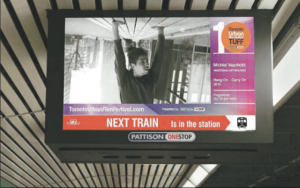Metro: TUFF the fest that’s about to take over city’s busiest spots!
 By Richard Crouse – Metro Canada
By Richard Crouse – Metro Canada
When most of us go to the movies, we head to the theatre.
But for nine days every year Torontonians can watch films on the way to the theatre … as long as they take the subway.
The tenth annual Toronto Urban Film Festival takes over all 346 PATTISON Onestop digital TTC subway screens from Saturday to Sept. 18 for a curated film fest consisting of 87 one-minute silent movies from all over the world.
“This city loves film and this is a festival that brings film right to the people while they are on their way to work,” says festival organizer Sharon Switzer. “They don’t have to go looking for it.
“I think it enhances the rider’s experience greatly. I have done other projects on the TTC and in other public spaces and this is the one that seems to have hit a chord with the city.”
Switzer came up with the idea for TUFF in 2006.
“It was the Onestop screens,” she says on her inspiration for the fest. “They were very new at the time. … People weren’t used to those screens. They were uncomfortable with them. It seemed like a really good way to give a voice to Torontonians and artists in this public space.”
TUFF has grown to become North America’s largest and longest-running commuter film festival, with an audience of more than one million daily commuters.
Switzer admits, however, the initial reaction from the artistic community wasn’t encouraging.
“From artists it was less than warm,” she says. “Unlike Americans, who I think would jump at the chance to be in a place that showed to a million people, artists in Toronto were a little bit suspect because it was a commercial application. It took some convincing.”
Plus, the one-minute format was unheard of at the time, she said. Now, it is everywhere.
“I went to all my friends and colleagues who taught film and video in universities and schools and got them to get their students interested. I had to get a generation going.”
The fest’s first decade has seen a shift in the kind of movies that get programmed.
“Years ago, I would have said experimental. But, over the years filmmakers have taken up the challenge and gotten so much better at telling stories. Our one-minute dramas work really well now. Also animation always works well without sound so we get a lot of great animation.”
This year offerings include international films from Iran, Trinidad and Tobago, “a very fun film from Slovenia” and 10 Canadian shorts from past festival winners.
“At the beginning of the festival they’re not ready for it,” Switzer says of the million or so commuters who will see the films. “But by a few days in they know to look and they do. They gather round sometimes. They point at and tell other people to look. It brings a community of people who notice something different is going on.”
